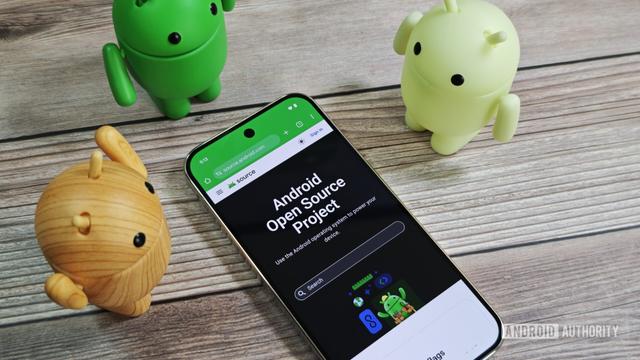Recent searches
Search options
#aosp
@1br0wn Yes indeed, it would be great to have a community controlled version of #AOSP. The hard part is that Google still is the largest contributor to Android by a large margin. The ROM projects have started to work together, but not enough to get community control. The #CalyxOS team has put quite a bit of effort into trying to get this idea going. The key would be to get companies to switch to a community-controlled version, e.g. Samsung, Xiaomi, Huawei, Oppo, etc.
"Exclusive: Google will develop the Android OS fully in private..."
Looking again at https://www.androidauthority.com/google-android-development-aosp-3538503/ I really think that was a PR piece, e.g. #Google's PR firm put together the story for #Android Authority. Its got all the markings, the "Exclusive" part, the uncritical eye "Google is simply consolidating its development efforts into a single branch", minimizing harm to custom ROMs, "custom ROMs will largely also see little change" etc

O problema é que, hoje mesmo, não é possível afirmar que o sistema operacional de nossas tornozeleiras eletrônicas de bolso e outros dispositivos com o mesmo é software livre simplesmente porque não temos nem uma das pré-condições para considerarmos isso, que seria acesso a todo seu código-fonte. Temos apenas parte inexequível por si só. O próprio sítio do projeto admite que não é possível executar "AOSP" em dispositivo físico algum. Quem ainda se esforça, como p. ex. LineageOS (mesmo sem serviços Google), para viabilizar determinado aparelho, lamentavelmente, só consegue fazê-lo funcionar ao incluir partes não livres.
Não deveriam nem alegar que "AOSP" seria sofware de "código aberto" pois tampouco está de acordo com tal definição pela OSI. Ou seja, até o nome do projeto parece mais um acinte com a comunidade. Publicidade daquelas.
Aqui entra o alerta de que Linux, o kernel tanto usado frequentemente com GNU, entre outros, como ainda, no caso em questão, por Android, também não é 100% de código aberto nem é totalmente considerado software livre, por razões similares.Então, conceitualmente, não muda muita coisa. Em minha opinião, já não dava pra considerar o conjunto da obra sequer como "source-available", a dúvida levantada, e continuará assim.
Ressalvo que afirmo isso tudo salvo melhor juízo. É apenas minha impressão diante da notícia cumulada com a interpretação pessoal do material da área. Nem faço parte oficialmente de qualquer coletivo formal.
#SoftwareLivre #CódigoAberto #FreeSoftware #OpenSource #FOSS #Android #AOSP #conceitos #teoria
Google's Move on Android AOSP Development
Google has moved the development of Android to a private repository, aiming to streamline the development process and reduce complexity. Despite this, the Android Open Source Project (AOSP) will continue to be released at regular intervals, ensuring it remains open-source and accessible.
However, this change has raised concerns among developers:
- **Transparency**: Developers are worried about the reduced visibility into ongoing development.
- **Contribution**: Some fear it may limit their ability to contribute and influence the project.
- **Community Reaction**: While some support the move for potential efficiency gains, others are skeptical and call for more transparency and assurances from Google.
I may be wrong (no), but this increased opacity isn't a good sign : « #Google will develop the #Android OS fully in private, and here's why »
› https://www.androidauthority.com/google-android-development-aosp-3538503/

#GWB - Android: Fundamentale Änderung beim AOSP – Google verlagert Entwicklung und schränkt Open-Source ein - https://www.googlewatchblog.de/2025/03/android-fundamentale-aenderung-beim-aosp-google-verlagert-entwicklung-und-schraenkt-open-source-ein/ #android #Google #aosp

whoa, #Android #AOSP no longer to be developed in the open -- source code will be made available in large releases instead https://arstechnica.com/gadgets/2025/03/google-makes-android-development-private-will-continue-open-source-releases/
so much for the android "open" source project; this puts it firmly in google's hands as google android (where previously their strategy was to make google-exclusive versions of the stock aosp apps like clock calendar calculator etc, they now just straight-up won't let you see what's going on in between ~yearly releases)

> While the shift to trunk-based development reduced this discrepancy, it persists and continues to pose challenges for Google.
> This discrepancy forces Google to spend time and effort merging patches between the public AOSP branch and its internal branch.
Poor little Google can't afford to keep AOSP public, and for sure they can't cope with the deluge of PRs from third-party contributors.
Maybe somebody should set up a Ko-Fi for them?
https://www.androidauthority.com/google-android-development-aosp-3538503/

#Android #AOSP
A Google muda estratégia e passará a desenvolver Android em sigilo e com isso vai dificultar quem lança aparelhos com versão customizada do sistema, as fabricantes e devs que customizam só vão conseguir lançar uma nova versão do sistema depois que a Google liberar a versão final para comunidade.

This is some bs. If AOSP development is made less publicly accessible it does NOT " simplify things for developers" but rather it hinders it for de-googled privacy respecting ROMs and their device ports. The need for continued and ramped up efforts developing alternative mobile OS's, like Ubuntu Touch, Sailfish OS, Droidian, Mobian, Postmarket, etc. is even more apparent with this move by Google.
#linuxmobile #degoogled #android #aosp #ubuntutouch #sailfishos #mobian

Google will develop the Android OS in private
https://www.androidauthority.com/google-android-development-aosp-3538503/

@portaloffreedom @notjustbikes unlikely, cuz making a new OS & Kernel from scratch is absurdly expensive and costly if you want more than 1980s TUI...
- #Winfows, #macOS & #iOS are #CCSS-licensed #Govware, whereas #AOSP can at least be salvaged & degoogled, as @LineageOS & @GrapheneOS show...
I do however expect #Linux distros to become mainstream.
I don't remember it being as annoying on #iPhone, TBH. The phone call would always be at the very top of the notification shade (IIRC), and would be highlighted green or something.
At least on the #Android build I'm on, the phone call is either tiny, or just not listed in the notification shade at all. When you're on the lockscreen, you must get out of the notification shade to answer the phone.
When your phone is unlocked, you have to use the notification shade to get to the call (and it's not prominent!!), because opening the phone app JUST OPENS THE PHONE APP, and doesn't take you to your call at all.
It might just be an #AOSP thing or possibly just a #CalyxOS thing, I don't know.
I'll have to test it now, I'm curious.
Installing a new OS on a phone has always been a daunting task! I've done it a few times, but always dreaded it.
So I'm really happy that @e_mydata has created an installer that seems like it could actually be used by most people!
It looks like a simple step-by-step GUI process. Except there's a warning at the start stating "Before proceeding with the installation, verify if the latest Android firmware is available for your device." and I don't know what that means or how to check







